Bridging Borders: Transnational Surrogacy, Queer Kinship & Reproductive Justice
On the heels of the U.S. Supreme Court’s 2015 marriage equality decision, some argued that “family equality” was the next LGBT movement priority, which was described in part as increased access to surrogacy for gay men. Media scrutiny of commercial surrogacy can tend to be myopically focused on the gay couples using it, which is unfair given the high rates of heterosexual couples who also enter into surrogacy agreements both domestically and abroad. Yet the need for a diverse discussion of LGBTQ families and communities’ needs in a post-Marriage moment persists, as does the problem of excluding the voices of women who engage in the physically risky acts of gestational surrogacy and egg donation—particularly when they work for wealthier couples traveling to their country because of decreased costs.
On February 19, a symposium was held at UC Berkeley* entitled “Making Families: Transnational Surrogacy, Queer Kinship & Reproductive Justice”. A key goal of the symposium was linking up these three areas of practice and study to address the social justice implications of the growing, unregulated tool shed of reproductive biomedicine.
At the “Making Families” workshop, an all-star panel of speakers was invited to discuss
“how the borders and limits to reproduction are constituted, both in repro-genetics and inter-country politics… what bio-politics of reproduction govern different national jurisdictions and transnational circuits, if and how queering kinship is possible, and how reproductive justice perspectives can be incorporated into practices such as egg donation and surrogacy.”
The workshop was an opportunity to begin bridging discussions and perspectives among the stakeholders, participants, and end users of transnational commercial surrogacy. We joined participants in livetweeting pictures and soundbites using #MakingFamilies. Here are some of the highlights of the panels we attended, in chronological order.
|
Charis Thompson (@charismt), Chancellor’s Professor andChair of Gender & Women’s Studies (“GWS”) at UC Berkeley, welcomed participants and opened the workshop by outlining three themes:
|
 |
 |
Thompson emphasized that the symposium was conceived as an attempt to bring into conversation these still-separate conversations of queer kinship, reproductive justice, and transnational surrogacy. Thompson recalled she has committed much of her working life to showing that biology cannot be used to justify social hierarchy, whether by race, class, gender, sexuality, or family form, because, as she said, biology is "too contingent, too multiple, too open to inter-species, and human innovation and reconfiguring". In her work she has attempted to show that while sexuality, race, gender, and family can be unanchored from the oppressive hierarchies of modernity by biological reproduction – in this process differences based on class, race, gender, sexuality, citizenship and ability reemerge in new sites. Exploring these deep tensions gave rise to this symposium. Its name was taken in part from Thompson's 2005 book, Making Parents: The Ontological Choreography of Reproductive Technologies. |
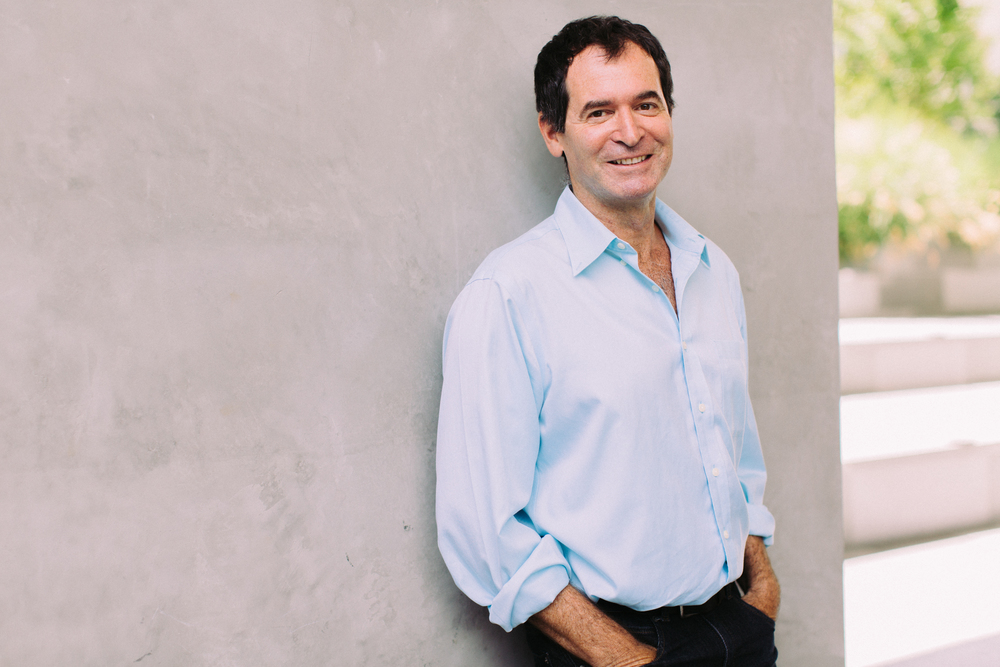 Joshua Gamson (@joshgamson), professor of Sociology at University of San Francisco and Fellow at the Center for Advanced Study in the Behavioral Sciences at Stanford University, spoke on ‘The Politics of Family Creation Stories’ and his work documenting LGBTQ people making families in his recent book, Modern Families: Stories of Extraordinary Journeys to Kinship. Gamson described two genres at play in books on fertility technologies that he sought to bridge:
Joshua Gamson (@joshgamson), professor of Sociology at University of San Francisco and Fellow at the Center for Advanced Study in the Behavioral Sciences at Stanford University, spoke on ‘The Politics of Family Creation Stories’ and his work documenting LGBTQ people making families in his recent book, Modern Families: Stories of Extraordinary Journeys to Kinship. Gamson described two genres at play in books on fertility technologies that he sought to bridge: 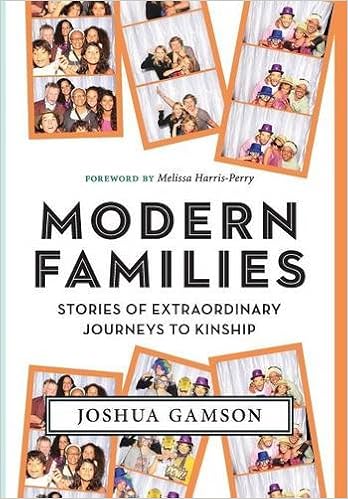 Repro Lit (the hero’s journey of overcoming obstacles, or as Melissa Harris Perry describes in the foreword to Modern Families, “fantasies that focus on end product and disregard transactional problems”) and Repro Crit (academic critiques of a marketplace of stratified reproduction, global politics, inequality, and the circulation of bodies). Gamson described the difficulty of navigating storytelling, particularly when telling the stories of marginalized groups. “When you insert counterstories, sometimes you’re just inventing a new set of myths.” Gamson teased out two points of connections between the queer kinship and reproductive justice conversations:
Repro Lit (the hero’s journey of overcoming obstacles, or as Melissa Harris Perry describes in the foreword to Modern Families, “fantasies that focus on end product and disregard transactional problems”) and Repro Crit (academic critiques of a marketplace of stratified reproduction, global politics, inequality, and the circulation of bodies). Gamson described the difficulty of navigating storytelling, particularly when telling the stories of marginalized groups. “When you insert counterstories, sometimes you’re just inventing a new set of myths.” Gamson teased out two points of connections between the queer kinship and reproductive justice conversations:
(1) the basic assertion that family justice requires self-determination in the making of our families and the use of our bodies for the making of kinship, doing so free of coercion and stigma;
(2) the notion of expanded understanding of kinship beyond nuclear and biological definitions of family and current policies, and the unexamined resources and networks of single parents.
 Associate professor of Gender and Women's Studies at UC Berkeley, Leslie Salzinger presented the paper of France Winddance Twine (@Winddance_Twine), professor of Sociology and documentary filmmaker at UC Santa Barbara, on ‘The Fertility Continuum: Racism, Biocapitalism and Postcolonialism in the Surrogacy Industry’. As Winddance Twine notes in her book Outsourcing the Womb: Race, Class and Gestational Surrogacy in a Global Market (2nd ed., 2015), reproductive justice advocates and feminists continue to critically examine commercial surrogacy because of the exploitation that arises from the utilitarian treatment of biocapital. Yet Winddance Twine noted that these challenges must be examined in the larger context of assisted reproductive technologies, including abortion and forced sterilization. Winddance Twine highlighted the important context of the history of slavery and eugenics, platforms to control the reproduction of the impoverished and elevate the reproduction of the privileged.
Associate professor of Gender and Women's Studies at UC Berkeley, Leslie Salzinger presented the paper of France Winddance Twine (@Winddance_Twine), professor of Sociology and documentary filmmaker at UC Santa Barbara, on ‘The Fertility Continuum: Racism, Biocapitalism and Postcolonialism in the Surrogacy Industry’. As Winddance Twine notes in her book Outsourcing the Womb: Race, Class and Gestational Surrogacy in a Global Market (2nd ed., 2015), reproductive justice advocates and feminists continue to critically examine commercial surrogacy because of the exploitation that arises from the utilitarian treatment of biocapital. Yet Winddance Twine noted that these challenges must be examined in the larger context of assisted reproductive technologies, including abortion and forced sterilization. Winddance Twine highlighted the important context of the history of slavery and eugenics, platforms to control the reproduction of the impoverished and elevate the reproduction of the privileged. 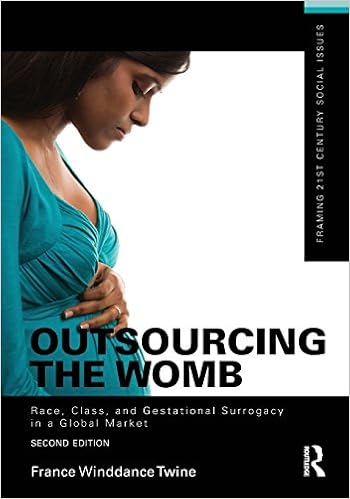 The fertility continuum, Winddance Twine argues, sets women into a fertility caste system that constrains their reproductive options according to race, class, ability. In particular, Indian transnational surrogacy recreates where value is extracted (poor, lower castes) and where it is invested (wealthy nationals and foreigners; privileged upper castes). One of the defining goals of reproductive justice, Winddance Twine argued, is to shift from the concept of “choice” to centering the safety, dignity, and health of women and their children—linked to the resources and power dynamics of their community. Winddance Twine quoted UPenn Law professor and CGS advisory board member Dorothy Roberts, who notes that the neoliberal trend toward privatized and punitive governments places reproductive responsibility on women, thereby making “private” health and reproductive inequities that should be seen as “public” health problems. Concluding, Winddance Twine argued that surrogates should be promised lifetime healthcare and reproductive options, and at a minimum, interpreters for the contracts they sign.
The fertility continuum, Winddance Twine argues, sets women into a fertility caste system that constrains their reproductive options according to race, class, ability. In particular, Indian transnational surrogacy recreates where value is extracted (poor, lower castes) and where it is invested (wealthy nationals and foreigners; privileged upper castes). One of the defining goals of reproductive justice, Winddance Twine argued, is to shift from the concept of “choice” to centering the safety, dignity, and health of women and their children—linked to the resources and power dynamics of their community. Winddance Twine quoted UPenn Law professor and CGS advisory board member Dorothy Roberts, who notes that the neoliberal trend toward privatized and punitive governments places reproductive responsibility on women, thereby making “private” health and reproductive inequities that should be seen as “public” health problems. Concluding, Winddance Twine argued that surrogates should be promised lifetime healthcare and reproductive options, and at a minimum, interpreters for the contracts they sign.
 Zakiya T. Luna (@zakiyaluna), assistant professor of Sociology at UC Santa Barbara and co-author of “Reproductive Justice” (Annual Review of Law and Social Science, 2013), spoke on ‘Where Reproductive Justice and Queering Family Meet (An Exploration)’. Luna described queering at the intersection of oppression and resistance to challenge and bring together those deemed marginal and committed to liberatory politics. Luna noted fertility discourses continually exclude women of color, single parent families are still seen as aberrant and deviant, and that there is a lack of community for women of color to access fertility care. Luna argued that black women’s infertility in particular is seen in the mainstream as oxymoronic, butting up against stereotypes of babymaking machines. She pointed to resistance efforts including Fertility for Colored Girls, and Brown Broken Eggs, and noted the need for intersectional research to push back against dominant narratives, highlighting social science research such as the “weathering hypothesis” which finds that due to the sustained effects of racism on the lives of black women, health outcomes improve with younger pregnancies—which flies in the face of widespread U.S. efforts to reduce teen pregnancies. Luna described vibrant race, gender, and reproductive justice activism centering on young parents, Forward Together’s Strong Families campaign, the Repeal Hyde amendment project, and the beautiful posters and viral memes that have been issuing forth connecting reproductive justice with issues ranging from Trayvon Martin’s shooting, environmental justice, trans healthcare, and even adoption. Yet Luna noted that reproductive justice advocacy has remained somewhat siloed from surrogacy, even though people in the movements talk to each other and are friends. Luna also shouted out CGS and Generations Ahead (which grew out of CGS’s Gender, Justice, and Human Genetics program in 2006, and unfortunately closed its doors in 2012), as organizations whose work draws out the historical treatment of race and gender in genetic and reproductive technologies. Luna also noted that celebrities on social media, including Kim Kardashian and Melissa Harris Perry, are talking openly about surrogacy and broadening the conversation to the mainstream, moving from the personal, to the political, to the classroom in the case of Perry, all at once.
Zakiya T. Luna (@zakiyaluna), assistant professor of Sociology at UC Santa Barbara and co-author of “Reproductive Justice” (Annual Review of Law and Social Science, 2013), spoke on ‘Where Reproductive Justice and Queering Family Meet (An Exploration)’. Luna described queering at the intersection of oppression and resistance to challenge and bring together those deemed marginal and committed to liberatory politics. Luna noted fertility discourses continually exclude women of color, single parent families are still seen as aberrant and deviant, and that there is a lack of community for women of color to access fertility care. Luna argued that black women’s infertility in particular is seen in the mainstream as oxymoronic, butting up against stereotypes of babymaking machines. She pointed to resistance efforts including Fertility for Colored Girls, and Brown Broken Eggs, and noted the need for intersectional research to push back against dominant narratives, highlighting social science research such as the “weathering hypothesis” which finds that due to the sustained effects of racism on the lives of black women, health outcomes improve with younger pregnancies—which flies in the face of widespread U.S. efforts to reduce teen pregnancies. Luna described vibrant race, gender, and reproductive justice activism centering on young parents, Forward Together’s Strong Families campaign, the Repeal Hyde amendment project, and the beautiful posters and viral memes that have been issuing forth connecting reproductive justice with issues ranging from Trayvon Martin’s shooting, environmental justice, trans healthcare, and even adoption. Yet Luna noted that reproductive justice advocacy has remained somewhat siloed from surrogacy, even though people in the movements talk to each other and are friends. Luna also shouted out CGS and Generations Ahead (which grew out of CGS’s Gender, Justice, and Human Genetics program in 2006, and unfortunately closed its doors in 2012), as organizations whose work draws out the historical treatment of race and gender in genetic and reproductive technologies. Luna also noted that celebrities on social media, including Kim Kardashian and Melissa Harris Perry, are talking openly about surrogacy and broadening the conversation to the mainstream, moving from the personal, to the political, to the classroom in the case of Perry, all at once.
 Laura Mamo (@lmamoHEI), professor of Health Education at San Francisco State University, spoke on ‘Queering Reproduction in Transnational Bioeconomies’ based in part off Mamo’s 2007 book Queering Reproduction: Achieving Pregnancy in the Age of Technoscience. Mamo noted that the book emanated out of her training in medical sociology and the lesbian baby boom, which occurred despite the fact that queer women were not the intended or desired end users of the quickly expanding assisted reproduction industry. Mamo expressed interest in modes of resisting structures of power, viewing technologies as flexible rather than determinative of results, and asking: what are the commercial and technological offerings structuring “choice” and is “choice” even an adequate framework? Mamo harkened back to Gamson’s talk at the start of the workshop, noting the tension between structural inequalities and personal experiences.
Laura Mamo (@lmamoHEI), professor of Health Education at San Francisco State University, spoke on ‘Queering Reproduction in Transnational Bioeconomies’ based in part off Mamo’s 2007 book Queering Reproduction: Achieving Pregnancy in the Age of Technoscience. Mamo noted that the book emanated out of her training in medical sociology and the lesbian baby boom, which occurred despite the fact that queer women were not the intended or desired end users of the quickly expanding assisted reproduction industry. Mamo expressed interest in modes of resisting structures of power, viewing technologies as flexible rather than determinative of results, and asking: what are the commercial and technological offerings structuring “choice” and is “choice” even an adequate framework? Mamo harkened back to Gamson’s talk at the start of the workshop, noting the tension between structural inequalities and personal experiences. 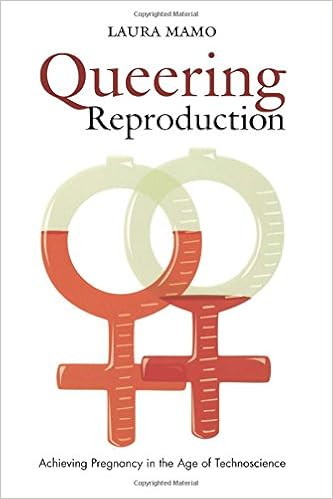 Mamo asked: In what ways is the figure of queer bodies implicated as an agent in the stratification of the flows and structures of the bioeconomies of human reproduction? Mamo described how LGBT intended parents are following capitalism across borders to fulfill American dreams by accessing price points not available at home, drawn from the world’s most vulnerable—this requires, Mamo argues, thoughtful inquiry into how queer kinship models can be accountable to the “collaborative reproducers” they find abroad. Mamo noted that even as gay dads and lesbian moms are used as the media hype and scrutiny focal point for discussions of surrogacy and three-parent IVF, the concerns of LGBT rights and queer justice are rarely centered in these debates. Mamo also cautioned that as assisted reproduction becomes more routine, options to make a genetic family are constructed as not just the best, but the only valid approach to queer kinship. Mamo described the new social expectations for LGBTQ people—similar to inclusion in the institution of marriage—that LGBT and queer families are now increasingly expected to participate in the act of “trying to have children.”
Mamo asked: In what ways is the figure of queer bodies implicated as an agent in the stratification of the flows and structures of the bioeconomies of human reproduction? Mamo described how LGBT intended parents are following capitalism across borders to fulfill American dreams by accessing price points not available at home, drawn from the world’s most vulnerable—this requires, Mamo argues, thoughtful inquiry into how queer kinship models can be accountable to the “collaborative reproducers” they find abroad. Mamo noted that even as gay dads and lesbian moms are used as the media hype and scrutiny focal point for discussions of surrogacy and three-parent IVF, the concerns of LGBT rights and queer justice are rarely centered in these debates. Mamo also cautioned that as assisted reproduction becomes more routine, options to make a genetic family are constructed as not just the best, but the only valid approach to queer kinship. Mamo described the new social expectations for LGBTQ people—similar to inclusion in the institution of marriage—that LGBT and queer families are now increasingly expected to participate in the act of “trying to have children.”
 Kim TallBear (@KimTallBear), associate professor of Native Studies at University of Alberta, Canada, spoke on ‘Making Love and Relations Beyond Settler Sexuality’ and opened this discussion by challenging colonial notions of scarcity in fertility rhetoric. TallBear noted that while the Malthusian demand for “population control” has often been used to further eugenic ends, in an anti-racist, reproductive justice context, discussions of population control are helpful to analyze: whose disproportionate reproductive success is being accomplished on the backs of under-privileged populations’ reproduction? TallBear argued: “We can’t avoid the question of who gets to have babies, and whose reproduction comes at the expense of others, both human and nonhuman.” TallBear said that a white nationalist middle class veneer that is often painted over the lives of indigenous kinship and communities, but that regardless, “I don’t see our failure at monogamy, nuclear family and marriage as failure.”
Kim TallBear (@KimTallBear), associate professor of Native Studies at University of Alberta, Canada, spoke on ‘Making Love and Relations Beyond Settler Sexuality’ and opened this discussion by challenging colonial notions of scarcity in fertility rhetoric. TallBear noted that while the Malthusian demand for “population control” has often been used to further eugenic ends, in an anti-racist, reproductive justice context, discussions of population control are helpful to analyze: whose disproportionate reproductive success is being accomplished on the backs of under-privileged populations’ reproduction? TallBear argued: “We can’t avoid the question of who gets to have babies, and whose reproduction comes at the expense of others, both human and nonhuman.” TallBear said that a white nationalist middle class veneer that is often painted over the lives of indigenous kinship and communities, but that regardless, “I don’t see our failure at monogamy, nuclear family and marriage as failure.”  TallBear outlined two basic tenets in indigenous feminisms: (1) caretaking the whole people, and (2) caretaking the relationship of the people to the land. TallBear stated that there was no such thing as a “single mother” in indigenous communities, “I am the mother of my sisters’ children, same for my brothers and his brothers' children.” TallBear also noted that she had not heard of indigenous women seeking out or using assisted reproduction technologies, despite the fact that the fertility rate of indigenous people outstrips white and black populations by a significant margin. TallBear suggested the concept of “reparative kinmaking,” not just with living persons, but with nonhumans, places, and ancestors: what she described as responsibilities to relations that are not yet/no longer material. Following up on her book, Native American DNA: Tribal Belonging and the False Promise of Genetic Science (2013), TallBear’s upcoming volume co-authored with multiple scholars including Donna Haraway and Alondra Nelson will describe caretaking kinship practices beyond making babies, rethinking kin relationships, and drawing on examples such as the American Indian movement and the Black Panther Party. TallBear closed with belated Valentine’s Day wishes: “May your loves be many, and not caged within colonial norms of romantic couple-centric bliss.”
TallBear outlined two basic tenets in indigenous feminisms: (1) caretaking the whole people, and (2) caretaking the relationship of the people to the land. TallBear stated that there was no such thing as a “single mother” in indigenous communities, “I am the mother of my sisters’ children, same for my brothers and his brothers' children.” TallBear also noted that she had not heard of indigenous women seeking out or using assisted reproduction technologies, despite the fact that the fertility rate of indigenous people outstrips white and black populations by a significant margin. TallBear suggested the concept of “reparative kinmaking,” not just with living persons, but with nonhumans, places, and ancestors: what she described as responsibilities to relations that are not yet/no longer material. Following up on her book, Native American DNA: Tribal Belonging and the False Promise of Genetic Science (2013), TallBear’s upcoming volume co-authored with multiple scholars including Donna Haraway and Alondra Nelson will describe caretaking kinship practices beyond making babies, rethinking kin relationships, and drawing on examples such as the American Indian movement and the Black Panther Party. TallBear closed with belated Valentine’s Day wishes: “May your loves be many, and not caged within colonial norms of romantic couple-centric bliss.”
 Michal Nahman (@michalnahman), senior lecturer at the University of the West of England, Bristol, gave a talk entitled, ‘Monstrous Extractions: Migration, Race and Colonialism in Global Reproductive Economies,’ discussing the racial dynamics of the market in women’s eggs, based on research laid out in her recent book, Extractions: An Ethnography of Reproductive Tourism (2013). Nahman’s talk described in detail her research in IVF clinics in Israel which led her to ask: “Is the egg the synecdoche [part representative of the whole] of a nation?” Nahman noted that she witnessed many IVF patients reject using “Arab eggs” and how this highlighted the overlapping domains of war, nation, survival, and reproduction. For Nahman, the desirability of white eggs mirrors nationalist political definitions of “citizen” and managing the border between Jew and Arab. Nahman also described the concept of “repro-migration”, where women fleeing particularly Eastern European countries in political turmoil may sell their “cheap white eggs” to finance their escape.
Michal Nahman (@michalnahman), senior lecturer at the University of the West of England, Bristol, gave a talk entitled, ‘Monstrous Extractions: Migration, Race and Colonialism in Global Reproductive Economies,’ discussing the racial dynamics of the market in women’s eggs, based on research laid out in her recent book, Extractions: An Ethnography of Reproductive Tourism (2013). Nahman’s talk described in detail her research in IVF clinics in Israel which led her to ask: “Is the egg the synecdoche [part representative of the whole] of a nation?” Nahman noted that she witnessed many IVF patients reject using “Arab eggs” and how this highlighted the overlapping domains of war, nation, survival, and reproduction. For Nahman, the desirability of white eggs mirrors nationalist political definitions of “citizen” and managing the border between Jew and Arab. Nahman also described the concept of “repro-migration”, where women fleeing particularly Eastern European countries in political turmoil may sell their “cheap white eggs” to finance their escape.  Nahman used the concept of “extraction” in line with local Israeli usage, where persons ask one another about their race, ethnicity, and migratory background by asking where they were “extracted” from: “Where were you taken out of?” She also noted its “monstrous” dimensions: “Capitalism is able to find new sites of extraction of wealth. Transnational reproduction practices are emblematic of capitalism; this shows us that love and desires can mix with inequality and technology, and that’s what makes these extractions ‘monstrous’.” To paint a picture of monstrous extraction, Nahman described the Jewish mythical creature of the Golem—a man made of clay awoken by mystical incantation to protect the Jewish community from attack, who sadly becomes uncontrollably violent in some myths. Nahman also noted that the etymology of “monstrous” is “to show” and “to warn” and quoted fellow speaker Sharmila Rudrappa: “Social hierarchies can only be confronted by a critical mass of actors working in tandem together.”
Nahman used the concept of “extraction” in line with local Israeli usage, where persons ask one another about their race, ethnicity, and migratory background by asking where they were “extracted” from: “Where were you taken out of?” She also noted its “monstrous” dimensions: “Capitalism is able to find new sites of extraction of wealth. Transnational reproduction practices are emblematic of capitalism; this shows us that love and desires can mix with inequality and technology, and that’s what makes these extractions ‘monstrous’.” To paint a picture of monstrous extraction, Nahman described the Jewish mythical creature of the Golem—a man made of clay awoken by mystical incantation to protect the Jewish community from attack, who sadly becomes uncontrollably violent in some myths. Nahman also noted that the etymology of “monstrous” is “to show” and “to warn” and quoted fellow speaker Sharmila Rudrappa: “Social hierarchies can only be confronted by a critical mass of actors working in tandem together.”
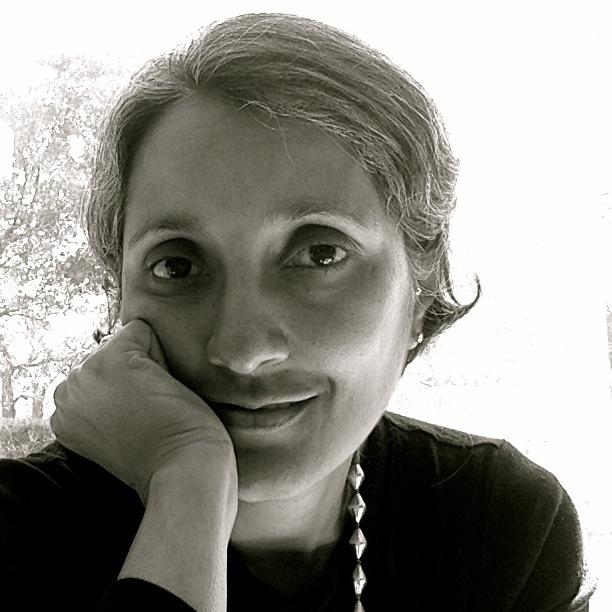 Sharmila Rudrappa (@rudrapper), associate professor in Sociology and director of the Center for Asian American Studies at the University of Texas at Austin, spoke on ‘Markets in Life: Of Earthworms, Sugarcane Farmers, and Surrogate Mothers in Southern Karnataka, India’ based off of research highlight in her new book, Discounted Life: The Price of Global Surrogacy in India (2016). Rudrappa’s new book maps the technologies of life and death and asks, “How do labor markets in surrogate mothers emerge? Is pregnancy wage labor?” Rudrappa concludes that fertility markets are not markets in life, but rather “necromarkets,” markets in death. Echoing TallBear, Rudrappa connected the violation of the people to the violation of the land, and descri
Sharmila Rudrappa (@rudrapper), associate professor in Sociology and director of the Center for Asian American Studies at the University of Texas at Austin, spoke on ‘Markets in Life: Of Earthworms, Sugarcane Farmers, and Surrogate Mothers in Southern Karnataka, India’ based off of research highlight in her new book, Discounted Life: The Price of Global Surrogacy in India (2016). Rudrappa’s new book maps the technologies of life and death and asks, “How do labor markets in surrogate mothers emerge? Is pregnancy wage labor?” Rudrappa concludes that fertility markets are not markets in life, but rather “necromarkets,” markets in death. Echoing TallBear, Rudrappa connected the violation of the people to the violation of the land, and descri bed a parallel necromarket in India: There are no more earthworms in Indian farms because of overuse of fertilization. And farmer suicides are on the rise once again. Rudrappa critically analyzed the frame emerging that women in India are simply “renting” the “empty space” in their bodies that “they’re not using anyways.” Rudrappa stated that viewing the women’s body as property is not new, as women in India and beyond have “belonged” to their husband, extended family, clan, and nation. But what is new, Rudrappa argues, is the women’s ability to “rent” this property to others. Rudrappa noted the biologically absurd efforts in the commercial surrogacy industry to “disentangle” a woman’s uterus from her body, only to “re-entangle” a woman’s body parts with legal and financial obligations and relationships.
bed a parallel necromarket in India: There are no more earthworms in Indian farms because of overuse of fertilization. And farmer suicides are on the rise once again. Rudrappa critically analyzed the frame emerging that women in India are simply “renting” the “empty space” in their bodies that “they’re not using anyways.” Rudrappa stated that viewing the women’s body as property is not new, as women in India and beyond have “belonged” to their husband, extended family, clan, and nation. But what is new, Rudrappa argues, is the women’s ability to “rent” this property to others. Rudrappa noted the biologically absurd efforts in the commercial surrogacy industry to “disentangle” a woman’s uterus from her body, only to “re-entangle” a woman’s body parts with legal and financial obligations and relationships.
Unfortunately, we were not present for the symposium's last two presentations, but we summarize below the speakers' earlier comments and incorporate remarks as sent to us by the speakers via email after the symposium.
 Marcin Smietana, postdoctoral fellow at UC Berkeley’s GWS department and co-organizer of the event, spoke on ‘Interpreting the narratives of surrogates and intended parents in the US’. Smietana’s project SurrogARTS carried out in collaboration with the ReproSoc research group at the University of Cambridge (UK), focuses on the experiences and bio-politics of surrogacy in the US and the UK, including transnational cases related to the unavailability of commercial surrogacy in Europe. In this project, since 2014 Marcin has been doing research with surrogates, egg donors, and fertility professionals in the US, as well as intended parents of different nationalities and sexual identities. The findings he presented show that the surrogates and parents normalize their non-normative family formation practices through two narratives: the affective and the economic ones. The affective narrative (which is inexistent in this form e.g. in Indian or Russian surrogacy) focuses on altruistic friendship ties between surrogates and parents, which de-commodify their relationships. At the same time, these relationships are de-kinned by normative family values, with both surrogates and parents emphasizing how surrogacy helps t
Marcin Smietana, postdoctoral fellow at UC Berkeley’s GWS department and co-organizer of the event, spoke on ‘Interpreting the narratives of surrogates and intended parents in the US’. Smietana’s project SurrogARTS carried out in collaboration with the ReproSoc research group at the University of Cambridge (UK), focuses on the experiences and bio-politics of surrogacy in the US and the UK, including transnational cases related to the unavailability of commercial surrogacy in Europe. In this project, since 2014 Marcin has been doing research with surrogates, egg donors, and fertility professionals in the US, as well as intended parents of different nationalities and sexual identities. The findings he presented show that the surrogates and parents normalize their non-normative family formation practices through two narratives: the affective and the economic ones. The affective narrative (which is inexistent in this form e.g. in Indian or Russian surrogacy) focuses on altruistic friendship ties between surrogates and parents, which de-commodify their relationships. At the same time, these relationships are de-kinned by normative family values, with both surrogates and parents emphasizing how surrogacy helps t hem each build their own nuclear families. In this sense, the interviewed gay father families appear as not very ‘queer’ but rather as ‘the families like we’d always known, but with two men’. To protect these nuclear family structures, when the affective narrative of friendship fails, the economic narratives of compensation and legal contracts have de-kinned the relationships between surrogates and parents well enough so as to save the deal. These processes are also framed in this way by the US fertility industry. They open the doors to genetic reproduction to some previously excluded collectives such as gay men, or women who can’t carry babies, sometimes from countries where surrogacy is legally restricted, yet only the most economically privileged among them get access to surrogacy. The socio-demographic data presented by Marcin also showed that half of the interviewed surrogates (as compared to almost all parents) hold university degrees. Marcin will continue this research in the UK in 2016-17, so as to compare the US ‘free market of ARTs’ with a more regulated British framework.
hem each build their own nuclear families. In this sense, the interviewed gay father families appear as not very ‘queer’ but rather as ‘the families like we’d always known, but with two men’. To protect these nuclear family structures, when the affective narrative of friendship fails, the economic narratives of compensation and legal contracts have de-kinned the relationships between surrogates and parents well enough so as to save the deal. These processes are also framed in this way by the US fertility industry. They open the doors to genetic reproduction to some previously excluded collectives such as gay men, or women who can’t carry babies, sometimes from countries where surrogacy is legally restricted, yet only the most economically privileged among them get access to surrogacy. The socio-demographic data presented by Marcin also showed that half of the interviewed surrogates (as compared to almost all parents) hold university degrees. Marcin will continue this research in the UK in 2016-17, so as to compare the US ‘free market of ARTs’ with a more regulated British framework.
 Judith Stacey, professor of social and cultural analysis and sociology at New York University [faculty profile], gave closing comments on 'Surrogacy, feminism & queer family politics' offering an "overview of dramatic shifts in the past 40 years of feminist and queer thinking and politics concerning nature, culture and technology in relation to procreation, marriage, gendered bodies and family discourse and practices." Stacey stated earlier in the day that the rising expectation of genetic family creation in queer and LGBT kinship practices is in some part a testament to the success of the right wing in pushing “family values.”
Judith Stacey, professor of social and cultural analysis and sociology at New York University [faculty profile], gave closing comments on 'Surrogacy, feminism & queer family politics' offering an "overview of dramatic shifts in the past 40 years of feminist and queer thinking and politics concerning nature, culture and technology in relation to procreation, marriage, gendered bodies and family discourse and practices." Stacey stated earlier in the day that the rising expectation of genetic family creation in queer and LGBT kinship practices is in some part a testament to the success of the right wing in pushing “family values.” 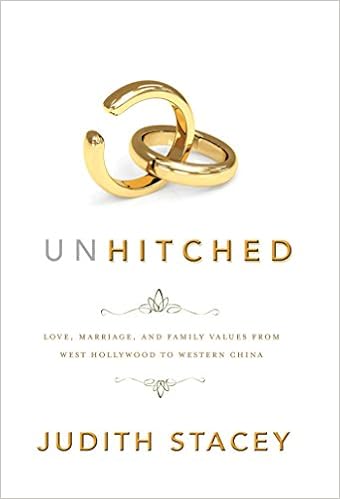 Stacey noted that during the Gay Liberation movement, older concepts of “the families we choose” were not defined by (or even meant to necessarily include) the creation of children as kin. Stacey also noted the enormous demographic disparities around the ability of people to “couple,” highlighting the impact of oppressive criminal justice and detention systems on communities of color. In line with the early gay and feminist studies, as well as with Kim Tallbear’s critique of settler colonial family models, Stacey also called for a broadening of the view of reproduction, quoting her research with the Moso people of Western China (discussed in her latest book in 2011, Unhitched: Love, Marriage, and Family Values from West Hollywood to Western China), whose reproductive decisions were not related to economic or sexual ones
Stacey noted that during the Gay Liberation movement, older concepts of “the families we choose” were not defined by (or even meant to necessarily include) the creation of children as kin. Stacey also noted the enormous demographic disparities around the ability of people to “couple,” highlighting the impact of oppressive criminal justice and detention systems on communities of color. In line with the early gay and feminist studies, as well as with Kim Tallbear’s critique of settler colonial family models, Stacey also called for a broadening of the view of reproduction, quoting her research with the Moso people of Western China (discussed in her latest book in 2011, Unhitched: Love, Marriage, and Family Values from West Hollywood to Western China), whose reproductive decisions were not related to economic or sexual ones
Video and audio of the workshop will be posted soon at www.makingfamilies.eu.
*Making Families was sponsored by the Marie Curie program of the European Union, the Department of Gender & Women’s Studies, and the Center for Science, Technology, Medicine & Society at UC Berkeley, in collaboration with ReproSoc research group at the University of Cambridge (UK). It was co-sponsored by the UC Berkeley’s Center for Race & Gender, Center for the Study of Sexual Culture, Department of African American Studies, and the Department of Ethnic Studies.
Previously on Biopolitical Times:
- Family Equality and Surrogacy
- Surrogacy as an Iceberg: 90 Percent Below Water
- Israeli Parents, Indian Surrogates, a Nepali Earthquake, and "Cheap White Eggs"
- Genetic Issues at the London Sperm Bank
- Cross-Border Reproduction: An "Ethic of Care" and an Unregulated Market
Images via professional websites, book publishers, Elliot Hosman/Center for Genetics and Society.



